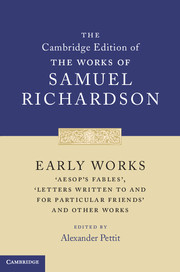Book contents
- Frontmatter
- Dedication
- Contents
- General Editors’ Preface
- Acknowledgements
- Chronology
- List of Abbreviations
- General Introduction
- Textual Introduction
- The Apprentice’s Vade Mecum (1733)
- A Seasonable Examination of the Pleas and Pretensions (1735)
- Preface to Aubin, A Collection of Entertaining Histories and Novels (1739)
- Aesop’s Fables (1739)
- Letters Written to and for Particular Friends (1741)
- Six Original Letters Upon Duelling (1765)
- Appendix: The Infidel Convicted (1731)
- Postscript
- Emendations
- Word-division
- Bibliographical Descriptions of Early Editions
- Explanatory Notes
- Index
Letter CXLVII
Published online by Cambridge University Press: 30 June 2022
- Frontmatter
- Dedication
- Contents
- General Editors’ Preface
- Acknowledgements
- Chronology
- List of Abbreviations
- General Introduction
- Textual Introduction
- The Apprentice’s Vade Mecum (1733)
- A Seasonable Examination of the Pleas and Pretensions (1735)
- Preface to Aubin, A Collection of Entertaining Histories and Novels (1739)
- Aesop’s Fables (1739)
- Letters Written to and for Particular Friends (1741)
- Six Original Letters Upon Duelling (1765)
- Appendix: The Infidel Convicted (1731)
- Postscript
- Emendations
- Word-division
- Bibliographical Descriptions of Early Editions
- Explanatory Notes
- Index
Summary
A Lady to her Friend, a young Widow Lady, who, having bury’d a polite and excellent Husband, inclines to marry a less deserving Gentleman, and of unequal Fortune.
Dear Madam,
Were I to lay it down for a Maxim, that Maids often mend their Circumstances by Marriage, Widows very rarely, I believe I might be justify’d by every one's Experience. To what can the Truth of this Observation be owing? Is it to be supposed, that Widows have stronger Passions than Maids? Shall the proud lordly Sex have it to boast, that they are such estimable Creatures, that when once one of them has had the Fortune to be chosen by a Lady, and has been taken from her by Death, she cannot live without taking another, and finds herself obliged to accept of the next that offers, thro’ all Disadvantages, and every Degree of Inequality? Surely this cannot be the Case! Surely a prudent, a modest Lady will not say this in so many Words!—Much less then ought she to confess it by her Actions, which are much stronger than Words. For I believe no Woman who ever enter’d the Pale of Matrimony with sprightly Hopes about her, found the Possession (Sex only consider’d) equal to her Expectations. The Maid may hope, may fansy much, in the Commerce between the Sexes, from her meditating on the heighten’d Scenes, which pernicious Novels, and idle Romances, the Poison of Female Minds, abound with. But the Widow knows ‘tis all Free-masonry, all empty Hope, flashy, foolish, unworthy, unpermanent, and, but for the Law of Nature, despicable.—Whence is it then, that the wishing, expecting Maid should be more prudent than the knowing, experienced Widow? Should be better Proof, with raised Imaginations, against Courtship or Persuasion, than one who well knows the transitory Vanity and Unsatisfactoriness of the End to which that Courtship or Persuasion tends?
If it be said, That this Point is not so much the Case, as the settled Life of Matrimony, which has been once so satisfactorily experienced; let the Circumstances of a Lady who abounds in every thing, answer this poor, but common Excuse; and let the Choice she makes of the Person and Fortune of her second Husband (which is generally, as I have observed above, in both Cases, far short of her former Choice) acquit or convict her, as her Conduct shall deserve.
- Type
- Chapter
- Information
- Early Works'Aesop's Fables', 'Letters Written to and for Particular Friends' and Other Works, pp. 480 - 482Publisher: Cambridge University PressPrint publication year: 2011



